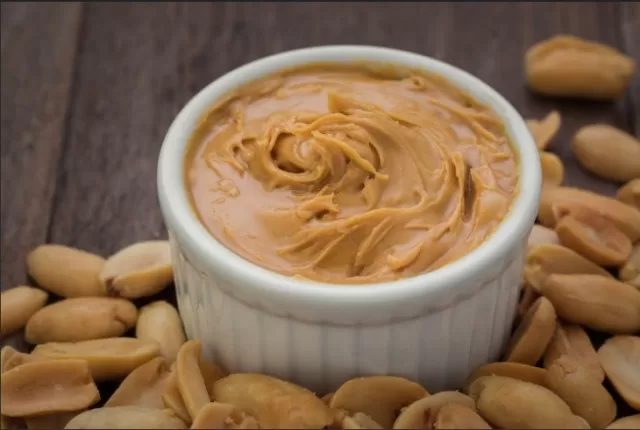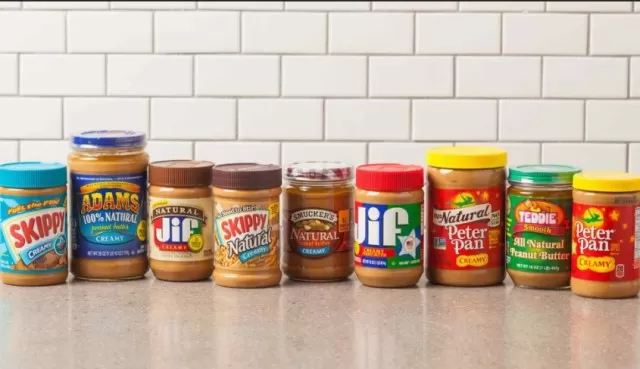Massive Recall: Thousands of Pounds of Skippy Peanut Butter.Skippy Foods has taken the proactive step of initiating a voluntary recall of approximately 161,000 pounds of peanut butter. This recall has been prompted by concerns of potential stainless steel fragments contaminating a limited number of peanut butter jars. The company issued a statement on their website to inform consumers about this issue. In the statement, they expressed their commitment to product quality and their deep regret for the situation, offering their apologies to their valued customers. This recall is a responsible measure taken to ensure consumer safety and product integrity.
Peanut Butter

Peanut Butter is a popular and Versatile food spread made primarily from ground roasted peanuts.
It’s known for its creamy or crunchy texture and rich, nutty flavor. Peanut butter is a staple in many households and is used in a wide variety of recipes, from sandwiches to baking and cooking applications.
It’s a good source of protein, healthy fats, and essential nutrients like vitamin E, niacin, and magnesium. Peanut butter comes in various forms, including natural peanut butter (with no added sugar or oils), commercial brands with added sweeteners and stabilizers, and even specialty varieties like organic, reduced-fat, or no-salt-added options.
It’s a beloved condiment that’s enjoyed by people of all ages and is A Key ingredient in popular dishes like peanut butter and jelly sandwiches, peanut butter cookies, and as a component in savory sauces and dressings.
Peanut Butter: A Nutty Legacy of Flavor and Nutrition

To establish a peanut butter business, you’ll need to follow a series of steps.
Here’s a simplified guide to get you started:.
Market Research:.
Begin by conducting thorough market research to understand the demand for peanut butter in your area.
Identify your target audience and their preferences.
Business Plan:.
Create a comprehensive business plan that outlines your business goals, strategies, and financial projections.
Include details about your target market, competitors, and pricing.
Legal Requirements:.
Register your business and obtain any necessary permits and licenses.
Consult with local health departments to ensure compliance with food safety regulations.
Suppliers and Ingredients:.
Source high-quality peanuts and other ingredients.
Establish relationships with suppliers who can provide consistent, quality ingredients.
Production Space:.
Set up a production facility that adheres to food safety standards.
You may start in a commercial kitchen, and as your business grows, consider a dedicated manufacturing space.
Production Process:.
Develop your peanut butter recipe and production process.
Invest in equipment like grinders and mixers to make the product efficiently.
Branding and Packaging:.
Create an appealing brand and packaging design.
This is essential for attracting customers. Consider sustainable and eco-friendly packaging options.
Distribution and Sales Channels:.
Decide how you will distribute your peanut butter.
Options include selling at local markets, through your website, or establishing partnerships with local stores and supermarkets.
Marketing and Promotion:.
Develop a marketing strategy that includes online and offline promotion.
Utilize social media, your website, and local events to raise awareness of your brand.
Quality Control:.
Implement a robust quality control system to ensure the consistency and safety of your product.
Regularly test for quality and taste.
Financial Management:.
Keep meticulous financial records, including expenses, revenue, and taxes.
Consider consulting with an accountant or financial advisor.
Scaling and Growth:.
As your business grows, consider expanding to new markets and increasing production capacity.
Explore the potential for introducing new peanut butter flavors or related products.
Customer Feedback:.
Listen to customer feedback and continuously improve your product and services based on their suggestions.
Sustainability and Ethical Practices:.
Consider sustainable and ethical sourcing and production practices, which can be a selling point for your brand.
Legal and Liability Protection:.
Ensure you have the necessary liability insurance and legal protections in place to safeguard your business.
Starting a peanut butter business can be a rewarding venture, but it requires careful planning and dedication to quality.
Be Prepared for competition and be open to adapting your strategies as your business evolves.
Recall Alert: Check Your Skippy Peanut Butter UPC Numbers

Consumers should be cautious if they suspect they possess a Skippy product that’s been recalled.
To verify, examine the UPC number on the product’s packaging. Specific UPC numbers identified with the recall include 37600-10520, 37600-10667, 37600-10499, and 37600-88095.
Note that products with UPC numbers not matching these are not part of the recall.
Approximately 9,000 cases of Skippy peanut butter have been flagged for recall across 18 states: California, Connecticut, Florida, Hawaii, Illinois, Indiana, Kansas, Minnesota, Missouri, North Carolina, Nebraska, New Hampshire, New Jersey, New York, Oklahoma, and Wisconsin.
If you reside in one of these states and realize you have purchased a recalled product, you can either return it to the store of purchase or reach out to the Skippy Foods consumer engagement line at 1-866-475-4779, available from 8 a. m.to 4 p. m.Central Time.
*The information is for reference only.